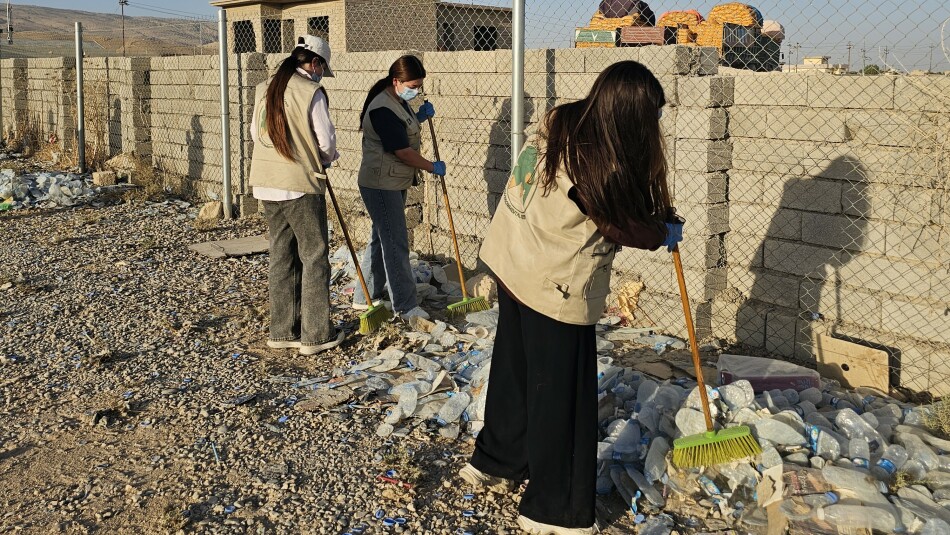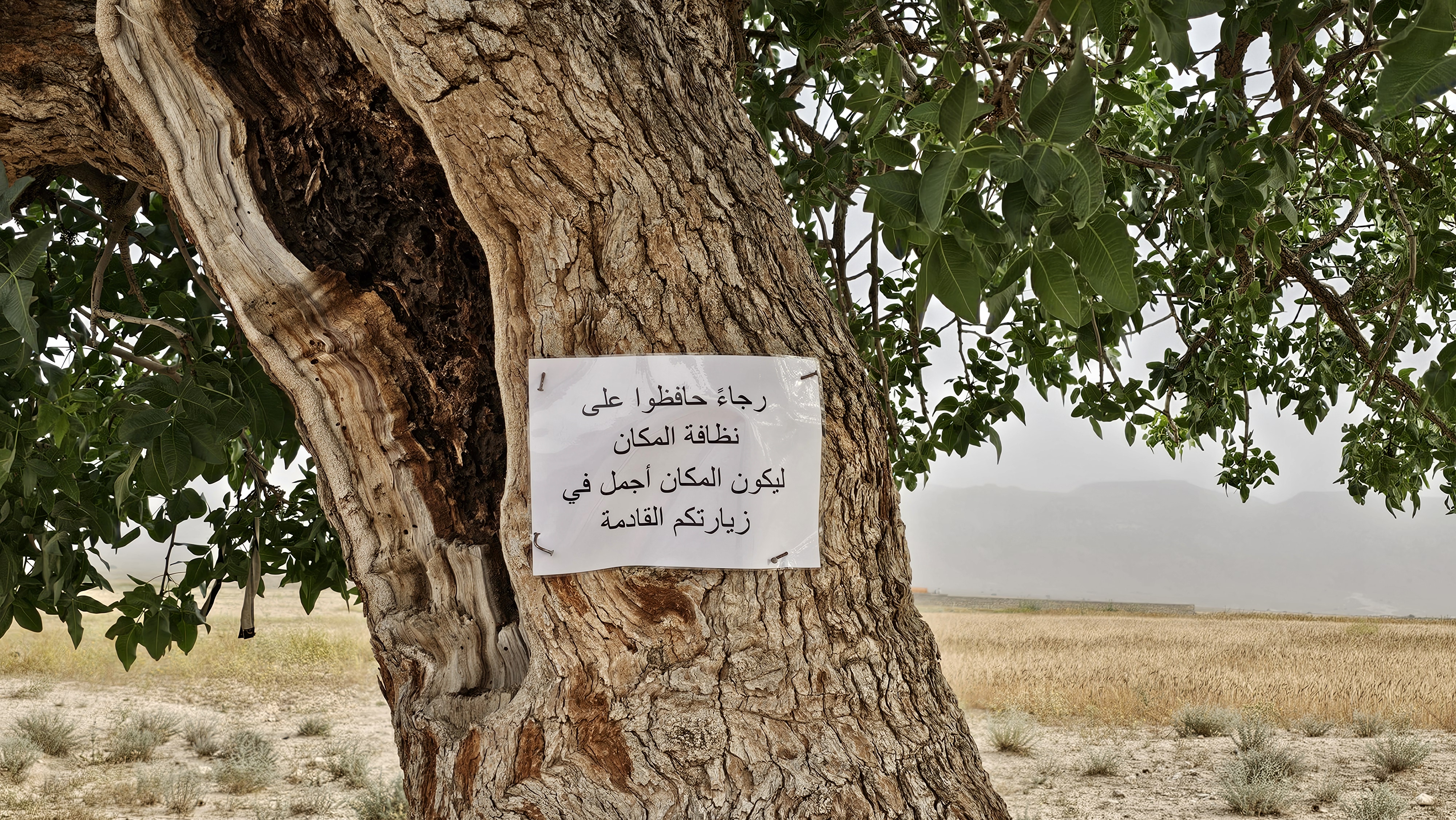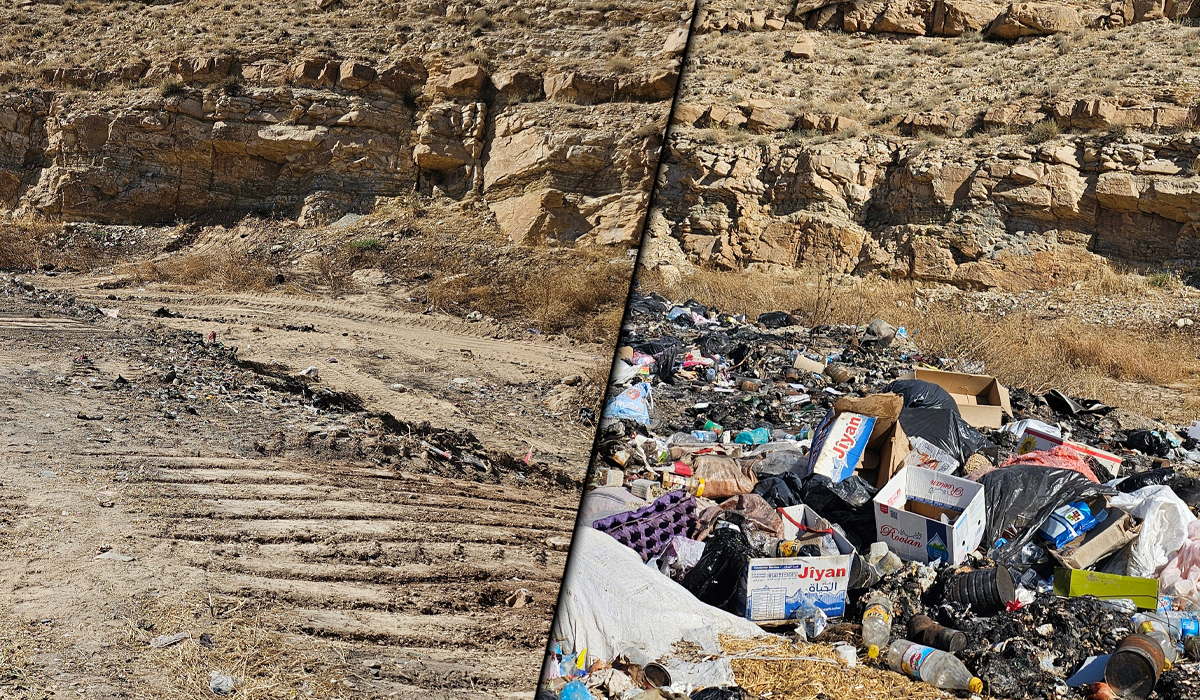
They clean every spot where waste accumulates, and they do not stop there, but rather launch a tree planting campaign as well to turn it into a green oasis and encourage the locals to protect the environment.
In light of the challenges of drought and desertification facing Shingal, the "Environment Protectors" team emerged as a small youth initiative fighting a big war to protect the environment, with simple capabilities and volunteer efforts.
When you ask any member of the volunteer team, they will answer that they fear for Shingal from desertification and drought, so they seek to reduce the causes of climate change.
According to statistics and warnings from the United Nations, Iraq ranks fifth among the countries most affected by climate change, as the risks of water scarcity, drought, rising temperatures, pollution, in addition to other natural disasters.
The effects of the war have increased environmental problems in Shingal. Statistics from the Iraqi Ministry of Environment indicate that the environment of Shingal district is still polluted with war remnants. The area of pollution exceeded 75 square kilometers and efforts are ongoing to tidy it.
These areas were chosen because they are exposed to waste accumulation due to the high demand for it by local residents during the spring season.
In August 2014, the "Islamic State of Iraq and the Levant - ISIL" took over Shingal district. As a result, thousands of its residents were subjected to campaigns of killing, kidnapping and displacement. Great damage was inflicted on the environment and nature of the region.
Our goal from the beginning was to provide an environmental service to our people and our land
From ideas to actions... tidiness and afforestation
Describing the motivation behind establishing this team at the beginning of this year, “our goal from the beginning was to provide an environmental service to our people and our land that was attacked by desertification,” said Mishaal Nawaf (25 years old), a resident of the "Dahola" complex in Shingal and founder of the "Environmental Protectors" team.
He pointed out that choosing the name of the team reflects the team's comprehensive vision to protect the environment as a whole.
"We are not limited to one aspect, but rather we work on everything that is beneficial to the environment."
The team began its first steps in May 2024 with a large-scale cleaning campaign that included tourist sites and city centers, such as Shingal Center, Sinuny sub-district, Karsi, Dahola, and Solagh, which constitute large areas in the district.
"These areas were chosen because they are exposed to waste accumulation due to the high demand from local residents during the spring season."
Nawaf and his team took pictures of the areas where they carried out the campaigns before and after cleaning them of waste to show the big difference that occurred in the environment of those areas.
"We wanted to start from areas that witness a large public presence, as a clean environment is everyone's responsibility, and our main goal was to spread awareness of the importance of preserving these areas."
However, his team does not have accurate statistics, but the team collected tons of waste.
Shingal Municipality transports the waste it collects to a landfill ten kilometers away from the district center, which harasses the residents of the area, as most of the waste is burned.
The situation in the rest of Iraq is no different, because waste is not treated but is buried directly underground or burned, causing damage to the environment and public health.
After the success of the first phase of cleaning, the "Environmental Protectors" team launched the afforestation initiative, which focused on planting trees in key areas such as the eastern and western intersections of the village of Dahola, Sinuny, and the areas surrounding commercial markets and security points.

Shingal youth spread environmental awareness in public places, Nineveh, 2024. Exclusively for (KirkukNow)
Nawaf explains that the campaign relied on an integrated work plan to ensure its success, which included identifying locations by the team visiting different areas to allocate suitable places for planting based on soil factors, humidity, and the extent of their benefit. In the next phase, the land is fully prepared to receive seedlings.
Trees and greenery are key components of the environment and protect the soil and air from pollution. They also reduce the effects of climate change. The United Nations confirms that life cannot last without trees because planting them contributes to reducing carbon emissions.
The afforestation initiative is still in its early stages, compared to the waste removal phase, and the campaign has resulted in the planting of 160 trees through self-efforts without any support from the government or organizations, and from carefully selected species, such as eucalyptus, silk tree, and jujube, which are drought- and heat-resistant trees.
Mashaal pointed out that the team seeks to ensure a sustainable environment.
"Before planting any tree, we would contact the residents, shop owners, or nearby security points and ask them if they are willing to look after these trees we plant here? If the answer is yes, we would complete the process, but if they refuse, which is rare, we would change the location."
A small team, a big challenge
The "Environmental Protectors" team consists of 12 volunteers, three girls and nine boys. The biggest challenge is the lack of an entity that provides for the team's needs, so they are forced to work according to their free time. This flexible organization allows each member to participate in a manner that suits their personal and professional commitments.
“The selection of team members was not random,” says Nawaf. “We were keen to attract people who have a real passion for volunteer work and a desire to serve their city, which contributed to forming a committed and effective team.”
He added that despite the team’s great enthusiasm, the work was not challenge-free.
The lack of funding made the team’s activities depend on the efforts of volunteers and their small financial donations.
Before the events of 2014, Shingal was home to 340,000 people from religious and ethnic backgrounds. Agriculture was one of the most important sources of livelihood for the residents, but the war cast its shadow on everything, even the environment. Shingal Mountain and the surrounding areas are famous for growing figs, olives, grapes, tobacco and others in addition to producing honey.
I loved the team's passion when I saw their work on social media, so I joined them
Khalasa Bakir, a 24-year-old volunteer, says, "I loved the team's passion when I saw their work on social media, so I joined them, but one of the biggest difficulties I faced was the lack of transportation, which made it difficult to reach some areas."
Ayman Hussein (25 years old), another volunteer from the northern district, explains, "Being responsible for a family, I face difficulty in providing time and money, but serving Shingal and seeing it more beautiful and cleaner is worth all this effort."
Hussein’s reward for his volunteer work is, as he says, "the encouraging word from people means a lot to us, because it confirms that we are on the right path."
Combating Desertification
The team's efforts are not limited to cleaning and planting trees, as they are planning future projects and seeking to prepare a new generation to protect the environment and confront desertification.
The "Environmental Protectors" team launched a new initiative targeting the newly built "Tairif" School.
"We have learned from one of the team members that the school needed to plant trees and provide waste containers. We visited the school to assess its needs, and then we began to identify suitable locations for planting trees," Nawaf, the team leader, explained.
During the campaign, 12 trees were planted in different locations within the school, in addition to distributing nine waste containers to the classes.
The team's role was not limited to this, as they were also keen to give an awareness lecture to students about the importance of preserving the environment, with the aim of instilling environmental awareness in them from a young age.
When you see the students' enthusiasm and interaction with the lectures, you realize the importance of educating the new generation
"Participating in the Tarif School campaign was an inspiring experience. When you see the students' enthusiasm and interaction with the lectures, you realize the importance of educating the new generation," Bakir defiantly said.
The repercussions of climate change have forced many residents to migrate from different areas of Iraq. According to statistics from the United Nations, about 147,000 people were displaced from their areas between January 2016 and July 2024.
Agricultural expert Ali Elias says that the climate changes that affected the region began nearly two decades ago. These changes resulted from several factors, including the cutting down of nearly one million trees from the Shingal forests, gas emissions from the cement factory, in addition to the remnants of wars that have damaged the environment.
He pointed out that "the agricultural lands in Shingal have become semi-desert, which has exacerbated the suffering of farmers."

A site in Shingal before and after it was cleaned of waste, Nineveh, 2024. Exclusively for (Kirkuk Now)
In his speech, Elias said, "One day we may have to leave Shingal, not because of wars as it happened in the past, but because of drought, the merciless drought."
Despite all of this, he expressed his appreciation for the environmental initiatives that seek to preserve the environment and ensure its safety, describing them as "excellent steps."
"In light of these challenges, individual and collective initiatives remain a hope that can alleviate the severity of the drought and bring life back to Shingal," Elias added.
According to official statistics issued by the Iraqi government, more than 53% of Iraq's area is at risk of desertification, and the United Nations says that Iraq loses 100,000 donums (10,000 hectares) of its land annually.
For a more stable life
Despite the lack of support from the government and civil society organizations, the work team received great moral support from the local population.
"Those who could help financially supported us, and those who could not, did not skimp on encouragement and moral support, which had a great impact on our continuation," Bakir said.
She adds that the gains are not few.
“The city's environment has become more beautiful, you no longer see piles of waste and people have become more aware. A clean environment is not only to add beauty, but it is reflected in health and provides a more stable life."
Shingal still suffers from the lack of a unified local administration and does not have local authority, and it is part of the disputed territories between the federal government and the Kurdistan Regional Government, so people eagerly look forward to what volunteers can offer.
Our goal is not only to plant trees, but to plant hope
Hussein says that Shingal has suffered greatly due to drought and the risks of desertification, and that the time has come to dispel some of these fears.
"We want to prove that young people have the ability to make a real and positive change."
The team’s efforts were not limited to planting trees, but extended to include continuous follow-up to ensure the success of the initiative.
They conducte regular inspection tours to monitor the planted trees, to ensure that they were taken care of and to prevent any neglect that might threaten their growth.
“Despite all the self-efforts we make, financial support remains an indispensable necessity for us. It is the key that enables us to expand the scope of our work. Instead of planting only ten trees, we will be able to plant 100 or more,” Nawaf said.
“We want to show that change begins with small steps, and that teamwork can make a big difference. We will continue our work, whether we receive financial support or not,” he added.
“Our goal is not just to plant trees, but to plant hope,” concluded Nawaf.